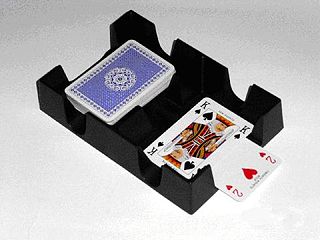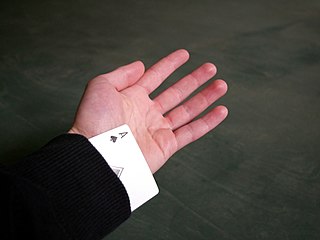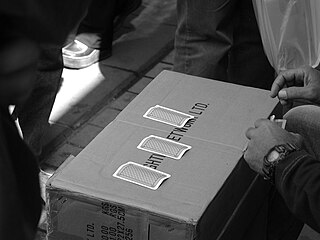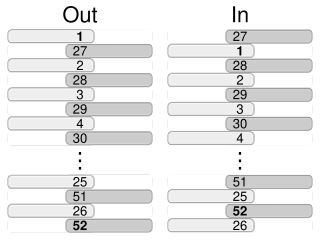Related Research Articles

Blackjack is a casino banking game. It is the most widely played casino banking game in the world. It uses decks of 52 cards and descends from a global family of casino banking games known as "twenty-one". This family of card games also includes the European games vingt-et-un and pontoon, and the Russian game Ochko. Blackjack players do not compete against each other. The game is a comparing card game where each player competes against the dealer.
Five-card draw is a poker variant that is considered the simplest variant of poker, and is the basis for video poker. As a result, it is often the first variant learned by new players. It is commonly played in home games but rarely played in casino and tournament play. The variant is also offered by some online venues, although it is not as popular as other variants such as seven-card stud and Texas hold 'em.

Shuffling is a procedure used to randomize a deck of playing cards to provide an element of chance in card games. Shuffling is often followed by a cut, to help ensure that the shuffler has not manipulated the outcome.

In card games, to cut the cards is to split the deck into two packets by lifting one packet from the top and placing it face down beside the remainder; before placing the lower packet on top of it. This is typically done after the cards have already been shuffled, and the procedure is used just prior to the cards being dealt to the players. The aim of this is to reduce the possibility of cheating, for example, by knowing the top or bottom card. Cutting the cards is also a common way of determining the seating order at a card table, the partnerships or the first dealer.

Cheating in poker is any behavior outside the rules of poker that is intended to give an unfair advantage to one or more players.

Faro, Pharaoh, Pharao, or Farobank is a late 17th-century French gambling game using cards. It is descended from Basset, and belongs to the Lansquenet and Monte Bank family of games due to the use of a banker and several players. Winning or losing occurs when cards turned up by the banker match those already exposed.

Card manipulation is the branch of magic that deals with creating effects using sleight of hand techniques involving playing cards. Card manipulation is often used in magical performances, especially in close-up, parlor, and street magic. Some of the most recognized names in this field include Dai Vernon, Tony Slydini, Ed Marlo, S.W. Erdnase, Richard Turner, John Scarne, Ricky Jay and René Lavand. Before becoming world-famous for his escapes, Houdini billed himself as "The King of Cards". Among the more well-known card tricks relying on card manipulation are Ambitious Card, and Three-card Monte, a common street hustle also known as Find the Lady.

A card sharp is a person who uses skill and/or deception to win at card games. "Sharp" and "shark" spellings have varied over time and by region.
Second dealing is a method of manipulating a deck of cards during a card game by way of dealing the second, rather than the top card of the deck, usually for the purpose of cheating. Second dealing and bottom dealing are also used in performance magic.
A trick deck is a deck of playing cards that has been altered in some way to allow magicians to perform certain card tricks where sleight of hand would be too difficult or impractical.

John Scarne was an American magician and author who was particularly adept at playing card manipulation. He became known as an expert on cards and other games, and authored a number of popular books on cards, gambling, and related topics.

Cardistry is the performance art of card flourishing. Unlike card magic, cardistry is meant to be visually impressive and appear very hard to execute.
Cheating in casinos refers to actions by the player or the house which are prohibited by regional gambling control authorities. This may involve using suspect apparatus, interfering with apparatus, chip fraud or misrepresenting games. The formally prescribed sanctions for cheating depend on the circumstances and gravity of the cheating and the jurisdiction in which the casino operates. In Nevada, for a player to cheat in a casino is a felony under Nevada law. In most other jurisdictions, specific statutes do not exist, and alleged instances of cheating are resolved by the gambling authority who may have more or less authority to enforce its verdict.

Card marking is the process of altering playing cards in a method only apparent to marker or conspirator, such as by bending or adding visible marks to a card. This allows different methods for card sharps to cheat or for magicians to perform magic tricks. To be effective, the distinguishing mark or marks must be visible on the obverse sides of the cards, which are normally uniform.
This is a glossary of conjuring terms used by magicians.

Three-card monte – also known as find the lady and three-card trick – is a confidence game in which the victims, or "marks", are tricked into betting a sum of money, on the assumption that they can find the "money card" among three face-down playing cards. It is very similar to the shell game except that cards are used instead of shells.

A poker dealer distributes cards to players and manages the action at a poker table.

The faro shuffle (American), weave shuffle (British), or dovetail shuffle is a method of shuffling playing cards, in which half of the deck is held in each hand with the thumbs inward, then cards are released by the thumbs so that they fall to the table interleaved. Diaconis, Graham, and Kantor also call this the technique, when used in magic.
The following is a glossary of poker terms used in the card game of poker. It supplements the glossary of card game terms. Besides the terms listed here, there are thousands of common and uncommon poker slang terms. This is not intended to be a formal dictionary; precise usage details and multiple closely related senses are omitted here in favor of concise treatment of the basics.
Walter Irving Scott was an American musician, cardsharp and amateur magician. His glowing reputation among magicians and card men revolves around his time as a card cheat and a single demonstration of sleight-of-hand to some of the era's best magicians in New York in 1930. He lived out his last years in Rhode Island as a music teacher. Scott spent his formative years perfecting several difficult sleights of card manipulation in order to work as a cardsharp in card games throughout America. He participated in several different types of swindles and hustles. Eventually turning to a music career he was asked to perform one more demonstration. This single event created a legend within the magic community that continues to this day.
References
- John Nevil Maskelyne, Sharps and Flats. ISBN 0-87019-049-0